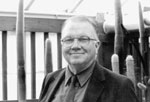Berkeley
- Botanist Robert Ornduff, an expert on California plants
and former director of the University of California, Berkeley's
Botanical Garden, died Sept. 22 at Alta Bates Medical Center
in Berkeley from complications of metastatic melanoma.
 Ornduff,
a professor emeritus of integrative biology in the College of Letters & Science at UC Berkeley,
was 68.
Ornduff,
a professor emeritus of integrative biology in the College of Letters & Science at UC Berkeley,
was 68.
Ornduff
was a field biologist who concentrated on California native
plants as well as plants that grow in similar Mediterranean
climates, such as in South Africa and Western Australia.
His book, "Introduction to California Plant Life" (UC Press,
1974), is still in print and is a popular layman's field
guide to one of the most varied floras in the world. He
also was a longtime member of the California Native Plant
Society and served as editorial advisor for its publication,
Fremontia, for 27 years.
"Bob
was a very, very caring person and a great teacher who deeply
loved and appreciated plants," said Peter Raven, his friend
for the past 45 years and director of the Missouri Botanical
Garden, an organization dedicated to the study and conservation
of the floras of the New World. "This came through in one
of his biggest contributions, which was turning the UC Botanical
Garden into a world-class garden and a leading place for
studying and displaying the unique variety of California
plants."
Ornduff
directed the garden from 1973 until 1991, expanding its
plant collection to include specimens from areas like South
Africa and Chile that have similar Mediterranean climates.
He was particularly proud of the docent program he instituted
while there, said Phyllis Faber, co-editor with Ornduff
of the Natural History Series at University of California
Press.
During
his 48-year career, Ornduff wrote more than 100 scientific
papers and 50 other papers on horticultural and related
topics. His interests ranged from the giant sequoias of
the Sierra Nevada to the small but showy yellow flower called
goldfields that carpet California's Central Valley in the
spring.
"Bob
was one of the treasures of the botanical world," said Arthur
Kruckeberg, professor emeritus of botany at the University
of Washington, Seattle, and one of Ornduff's mentors. "He
was a greenthumb botanist who delighted in growing plants
and disseminating his interest to the general public."
Among
his abiding interests, however, were the unusual reproductive
strategies of plants and how they evolved. After encountering
early in his career a peculiar fall-blooming California
plant called Jepsonia, he got interested in heterostyly,
a peculiarity of some plants where a single species develops
two or three different types of flowers that encourage outcrossing
and discourage self-pollination.
He also
was fascinated by the plants that evolved to inhabit small
islands - essentially rocks frequented by birds - that he
referred to as guano islands, Kruckeberg said.
Born
in Portland, Oregon, on June 13, 1932, Ornduff attended
Reed College, graduating in 1953 with a BA in biology. As
a Fulbright Scholar, he spent the next year in New Zealand,
where he collected material for his thesis. He completed
his MSc at the University of Washington in 1956 and his
PhD at UC Berkeley in 1961.
After
a year teaching biology at Reed College and a year at Duke
University, he returned to UC Berkeley in 1963 to assume
the faculty position of his retiring major professor, Herbert
Mason. Ornduff retired in 1993.
As a
botany professor, he instituted a popular course on California
flora that he taught for 30 years. The notes and experiences
teaching this course resulted in his book on California's
plant life. He also wrote two chapters for a recent book,
"California's Wild Gardens: A Living Legacy," edited by
Faber and published by the California Native Plant Society.
His other
positions while at UC Berkeley included curator of seed
plants and, eventually, director from 1967 to 1982 of the
University Herbarium; director of the Jepson Herbarium,
a repository for California plants, from 1968 to 1982; chair
of the Department of Botany from 1986 until 1989, when the
department was reorganized into the Department of Integrative
Biology; and executive director of the Miller Institute
at UC Berkeley from 1984 to 1987.
Ornduff
was involved with many plant and plant conservation organizations.
In addition to being a fellow of the California Native Plant
Society, at the time of his death he was a member of the
board of councilors of the Save-the-Redwoods League, the
board of directors of the Pacific Horticultural Foundation
and the board of trustees of the Center for Plant Conservation,
a national organization dedicated to preserving rare and
endangered plants of the United States. He also served as
president of the California Botanical Society in 1981-82,
and was a long-time trustee of UC Berkeley's Jepson Herbarium.
For the
past eight years, he was grants director of The Stanley
Smith Horticultural Trust, which funds research and education
in horticulture. Ornduff redirected the trust's grants towards
small gardens and publication projects both in the United
States and abroad.
He also
served as president of the American Society of Plant Taxonomists
in 1975 and chaired the editorial committee of UC Press
from 1975 to 1989.
Among
his honors were an Award of Merit from the American Association
of Botanical Gardens and Arboreta (1993), a Merit Award
from the Botanical Society of America (1993) and the F.
Owen Pearce Award of Horticulture from the Strybing Arboretum
in San Francisco (1994).
Ornduff,
a resident of Berkeley, is survived by a sister, Anne Vial,
of Lake Oswego, Oregon.